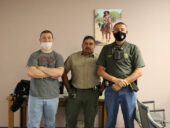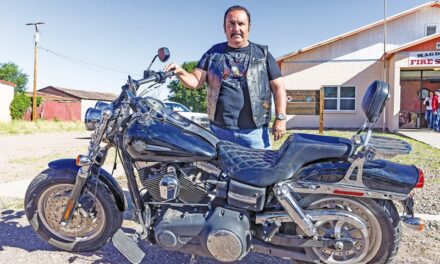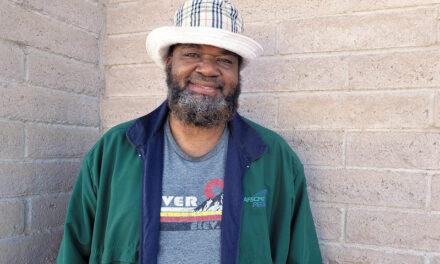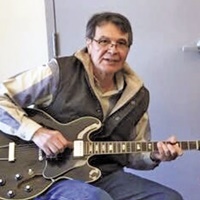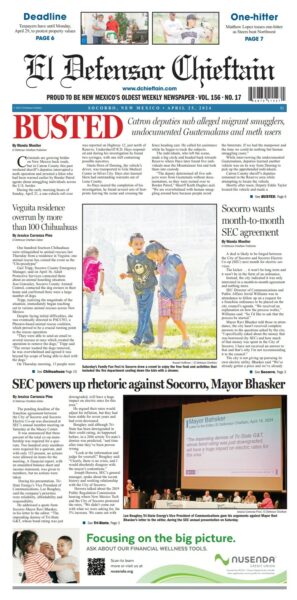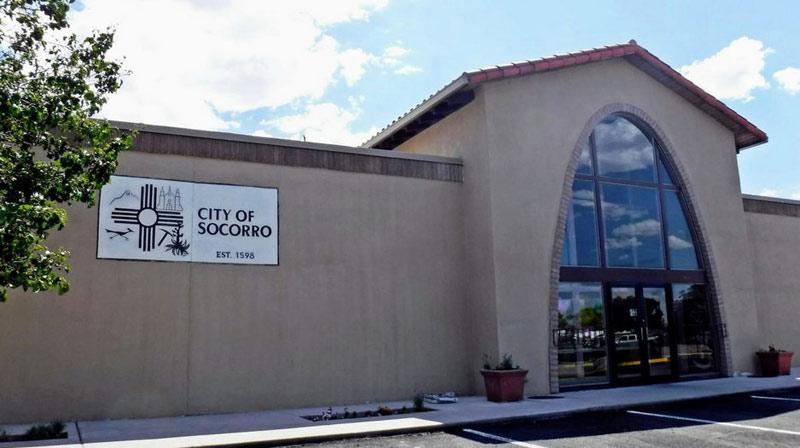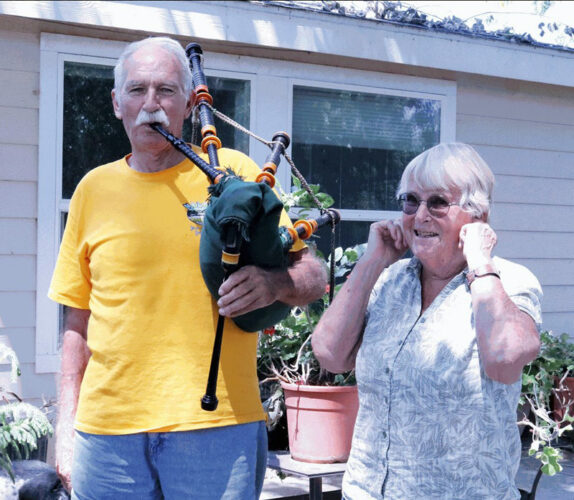
Hans’ wife, Gabrielle, insists that he practices his bagpiping outside for her own sanity. Heynekamp learned the play the bagpipes after his wife clipped an article from a local newspaper about a bagpipe instructor. Greg Byrd| El Defensor Chieftain
Johannes Heynekamp, better known as ‘Hans’, has been through it all on his journey from being born in a small town in the Dutch Colonial Indonesian Provence of Java in 1938 to living in Socorro. For those that don’t know him, Hans is best known for his bagpiping skills at many local community celebrations. He welcomed El Defensor Chieftain into his home to learn about his story.
Question: What type of upbringing did you have growing up as a Dutch colonial citizen?
Answer: My father was a teacher and he got a job in a Dutch occupied area of India when my family moved to a small fishing town at the time called Cheribon. We then moved to Jakarta when I was very young and that was my first memories when the (WWII) airplanes came and invaded in the early 1940’s. I was too young to be sure if it was Japanese airplanes or Dutch airplanes or German airplanes. The most vivid first memories were workers building very thick shelters made out of wood to hopefully protect their families from bombing raids.
Q: Did your family stay in the city?
A: Yes. We moved to Jakarta because the Japanese were rounding people up from the east but eventually we ended up in a concentration camp. I was three at the time and this was an extermination camp. My elder brothers were put into separate camps because they were old enough to procreate and were treated much better.
Q: How long were you there?
A: Several years. Fortunately we all made it out when the Americans came to liberate us and I remember us celebrating by watching movies and eating good beef and bread. At eight we traveled back to Holland where our parents taught while Europe was rebuilding and kids like myself and my siblings whom worked in the internment camps were discriminated against by kids who’s parents fought.
Q: What did you do after grade school?
A: I became a medical doctor for the Dutch army. At that time everyone went through Marine type bootcamp so it was very rough. From there I traveled to Germany around 1963 which was difficult to be so close to these concentration camps there. It was around this time I started drinking very heavily.
Q: How did you end up in the United States?
A: During my last few months in the army one of my senior doctors and drinking buddies wanted to convince me to practice medicine in the United States because he loved Johnny Cash. One of my older brothers, Christian, was also working as an astronomer in Boulder, Colorado at the time. So I went to live and work in Denver as an intern at Mercy hospital.
Q: What was it like living in America?
A: It didn’t last long at first. During my internship pictures from Vietnam started to pop up on the television and I really wanted to go over there and serve. Unfortunately I was too old at 27 so they would not take me initially. After a period of time I came back to the enrollment officer and she approved me. The next day I was in New York and then the next day I was in Saigon. It happened very fast. I was part of different medical teams. After that I went back to Holland which is where I met my wife Gabrielle who was a friend of my sister.
Q: How did you come back to America?
A: My wife and I got married in 1971 then I returned to Vietnam multiple times. We ended up living in Arizona. I was still a foreigner and Arizona gave me a limited license to practice medicine. My wife and I had one kid with another on the way so I wasn’t going back to Vietnam even though I wanted to.
Q: What was your experience coming back to America with your wife?
A: At first it was good. We had children. But unfortunately I was an alcoholic and was very abusive and a mean drunk. I finally went to rehab in 1980 around the same time my wife left me for several months. Through counseling we were able to reconcile. Coming out of that experience I decided that I wanted to be a rancher. We moved to a tiny farm in Reserve, New Mexico. With money not working, I moved to Silver City working as an E.R. doctor. From there I worked in Hobbs, Grants, Roswell and Gallup as well. In the meantime time my son Mick, who attended Tech, opened up Socorro Springs Brewery and that is what brought us here in 1998. I finally retired from E.R. work in 2007.
Q: So your son went to Tech but ended up a local brewer?
A: Yep. I always like to joke that I drank more beer in my life than most people and never earned a dime off of it.
Q: How did you become the well known in Socorro go to bagpiper?
A: I was living in Silver City and really enjoyed watching bagpipers play. My wife clipped out an ad to learn from a local instructor and that got me going. I even played at my old teacher Jack Cunningham’s funeral. Now I am a member of the Shiners. That is an organization that travels to play at children’s hospitals.
Q: A few random questions, what is your favorite movie?
A: I always loved the ‘Monty Python’ group so I’d probably go “The Meaning of Life”. I like the humor. That was real movie stuff. Much better than the gory things you see today.
Q: What is your favorite type of music?
A: Hispanic. Buena Vista Social Club comes to mind. It’s happy music. What else could you ask for.
Q: If you could live anywhere else in the world where would it be?
A: I would go back to Vietnam. I’ve actually been involved with organizations training hospital workers in rural areas in the past. I love the tropics. Once you hit sea level it just feels like home.
Q: If there was something that you could change about Socorro County, what would it be?
A: I would like for people to have the chance to be better educated. The simple lack of things like quality internet that the SEC does not provide holds kids back in today’s society. You even hear about kids moving to Albuquerque and being two to three grade levels behind other students. We have got to improve education.
Hans recently played during the Veteran’s Day festivities on the Plaza and plans to play several more events throughout the year.

